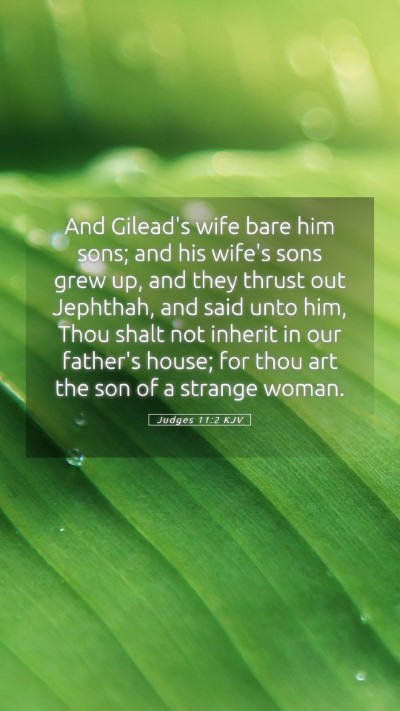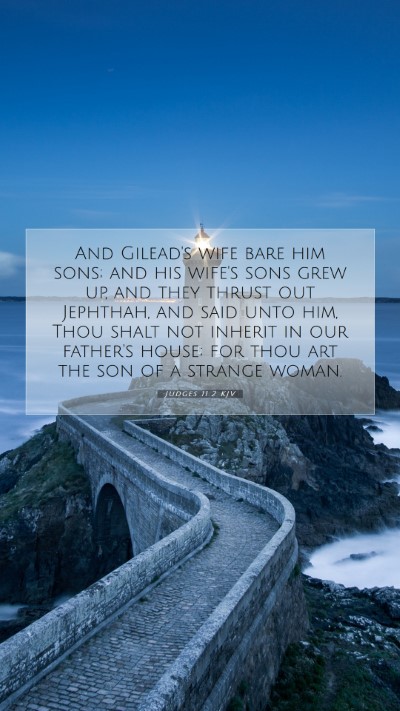Understanding Judges 11:2
Judges 11:2 states: "And Gilead's wife bore him sons; and his wife's sons grew up, and they thrust out Jephthah, and said unto him, Thou shalt not inherit in our father's house; for thou art the son of a strange woman."
Contextual Overview
The passage addresses the background of Jephthah, a significant judge in Israel's history, whose early life reflects themes of rejection and divine purpose. This context is vital for any Bible verse commentary as it sets the stage for understanding Jephthah's later role as a leader and savior of his people.
Key Themes from Public Domain Commentaries
-
Matthew Henry:
Henry emphasizes the social stigma faced by Jephthah due to his illegitimacy. He points out that Jephthah, despite being an outcast, is later chosen by God to deliver Israel. This reflects the overarching biblical theme that God often uses those whom society marginalizes for His purposes.
-
Albert Barnes:
Barnes highlights the familial rejection Jephthah experienced. His interpretation sees this verse as a demonstration of the consequences of a father's sin and the complex dynamics of family relationships. Yet, Jephthah’s character and resilience eventually shine through, depicting the struggle for identity and acceptance.
-
Adam Clarke:
Clarke notes the historical context, shedding light on the practices of inheritance and the societal views regarding legitimacy. He suggests that Jephthah’s expulsion was a common practice at the time, yet it foreshadows his rise as a great leader, highlighting the divine orchestration at play.
In-Depth Analysis
Judges 11:2 requires in-depth Bible verse analysis due to its rich implications for Bible study groups. The verse underscores family rejection, a common theme in scripture, illustrating how God’s choices often defy human expectations.
Historical Context and Social Implications
The term "strange woman" indicates Jephthah's mother was likely a foreigner, suggesting he was viewed as less than the legal children of Gilead's wife. Such context assists in understanding the societal norms of the time and informs our Bible study insights regarding issues of acceptance and identity.
Application for Today
This passage encourages modern readers to reflect on how society views individuals who may be considered outsiders. The application of Bible verses like Judges 11:2 can inspire Bible study lessons that center on inclusion, God’s plan for all individuals, and the value of every person in His sight.
Cross References
- 1 Samuel 16:7: God's choice of David, ignoring outward appearances.
- Luke 2:7: Jesus' humble beginnings as a reflection of societal rejection.
- Matthew 9:12: Jesus' teaching about His mission to the marginalized.
Conclusion
Judges 11:2 serves as a poignant reminder of God’s sovereignty and the unexpected paths by which He works. By studying this verse through various Bible study resources and commentaries, believers can gain a deeper understanding of Scripture and its relevance in their lives.
In summary, this verse invites profound Biblical exegesis, illustrating how personal challenges can lead to greater purposes within the grand narrative of God’s plan, extending the invitation to all readers to explore their unique roles in this divine tapestry.


